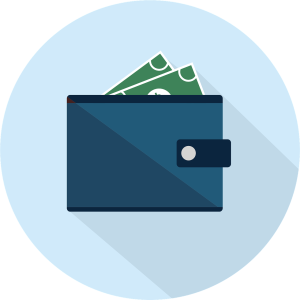Written by Justus Miller, University of Virginia | ISI Florence Spring 2025
Why is it important to budget while abroad?
Budgeting is important. It is a life skill that helps you with financial stability and helps set a baseline where you are controlling your money and where it is going, being aware of your spending. It allows one to save for an automobile or meet financial goals such as paying off debt or loans. While studying abroad is not quite the same, one is still paying for tuition, rent, and course fees, which may have been fully paid prior to your arrival, but also has travel, groceries, dining out, perhaps shopping for clothes, souvenirs, etc.

When studying abroad, everybody comes from different monetary backgrounds, some solely using a parent’s card, others have a monthly allowance. In contrast, others have saved up various amounts from jobs, scholarships, and grants, with only a set amount of funds to spend throughout the semester, and without an income. If you have worked, you are typically used to a bi-weekly paycheck to budget with, or perhaps a monthly benefits check, or parents dropping money in your account, and studying abroad could have changed that; typical students do not have a paycheck. This means that the funds in your account are likely not increasing at any given time, solely decreasing as you lack an income but still have expenses.
Every study abroad student has a different amount available to spend, and it is important to get an idea of yours, such as to make potential travel plans, allot amounts to eat out and try new foods, as well as have experiences. While doing this, it is important not to compare your funds to others, noting different backgrounds, and that having different amounts of money does not need to limit your study abroad experience. Money is solely an aid, which may lead you to different things, perhaps an underground bar, or more authentic fresh markets; and having a budget, and sticking to it is not shameful, but rather respectable and responsible of you.
What happens if I don’t stick to my budget?

ADJUST! Whether that means adjusting the amounts you have allotted to different categories or adjusting your spending to stick to it. It is important to be flexible, not to let money be a stressor or to put a damper on your study abroad experience, but rather to note how to improve and do better.
Personally, I have failed a budget or two, things like dropping your phone in the Venice Canal or forgetting to validate a tram ticket, which ends up with you spending a couple of hundred dollars that you were not expecting, or did not budget for. This is understandable; you are only human, and life happens. Whether it is your first or seventeenth time budgeting, you are learning life skills and growing as a person. However, this has also led me to understand the importance of an emergency, or as I call it, an ‘oopsies’ fund, to ensure a couple of hundred dollars are set aside in case something happens, because you truly never know.
Try a spreadsheet

Feel free to search for a budgeting sheet, available on Google Sheets and Excel, and customize it to fit your budget. Edit categories to match what you need; feel free to add or edit them throughout your experience.
If a spreadsheet is not for you, there are many budgeting apps available for downloading. Additionally, some banks incorporate a budgeting tool for planning purposes and make it available to you from your account. Look into your bank and find out its resources.
Step-by-step guide to creating your own budget
For starters, one needs to decide how much money they have and how much they have allotted to spending during their time abroad. One can leave it like that and divide certain percentages into various categories, or take the semester budget and divide it into months, and then into each category. For example, if you are allotted twenty-five hundred dollars for the semester, you can either divide that into the 4 months studying abroad with $625 dollars a month and budget that each month, or take your entire study abroad amount of $2500 and allot an amount, such as $400 for groceries, and then divide that into the 4 months to have roughly $100 a month towards groceries. Either method works; it just depends on what is easier for you to break down and budget.
Once you have established your set amount per semester or per month, decide what your spending categories will be. This can include groceries, eating out, nights out (including club cover fees, and drinks at bars, etc.), travel (which can be divided into subcategories of flights/transportation, accommodations, food budget, souvenir shopping) fun funds (for experiences, like wine tastings, or pasta making class), or any other categories you want to categorize, and then most important a little oopsies funds (just money set aside in case of something unexpected. One would recommend medium-sized categories, not too broad, so that it is difficult to categorize what falls where, but not so niche that budgeting becomes tedious.

Now, a certain amount or percentage of the budget is allotted to the categories. Noting which ones are more and less necessary and important. Such as groceries and eating out may be a bit larger given you need to have food and eat every day, and that category does not need as much as your nights out, buying drinks at the bars, and paying your club dues.
Now that you have your percentages and your budget for your study abroad, you can break this down monthly, weekly, or biweekly to ensure you are sticking to your budget and adjusting as you see fit.
As you budget, note how much you over- or underspent, possibly adjust your categories to reflect better where you spend the money, and keep that monthly cap on the budget. If you have extra funds, you can decide to save them or add them to your next budget because a little extra cash never hurts.
My little notes and suggestions
- I highly recommend a little oopsies fund. I hope you do not need to use it, but I used this to pay for hospital bills (which get refunded, but I may need to use it for a moment). My suggestion would be roughly $250, or $50 to $100 a month. And if you do not use it, then it can be extra money, etc.
- I also recommend that, with travel, you book it early. So, you may spend more in that first month or two booking and planning all your travel information, paying for flights, and your accommodation.
